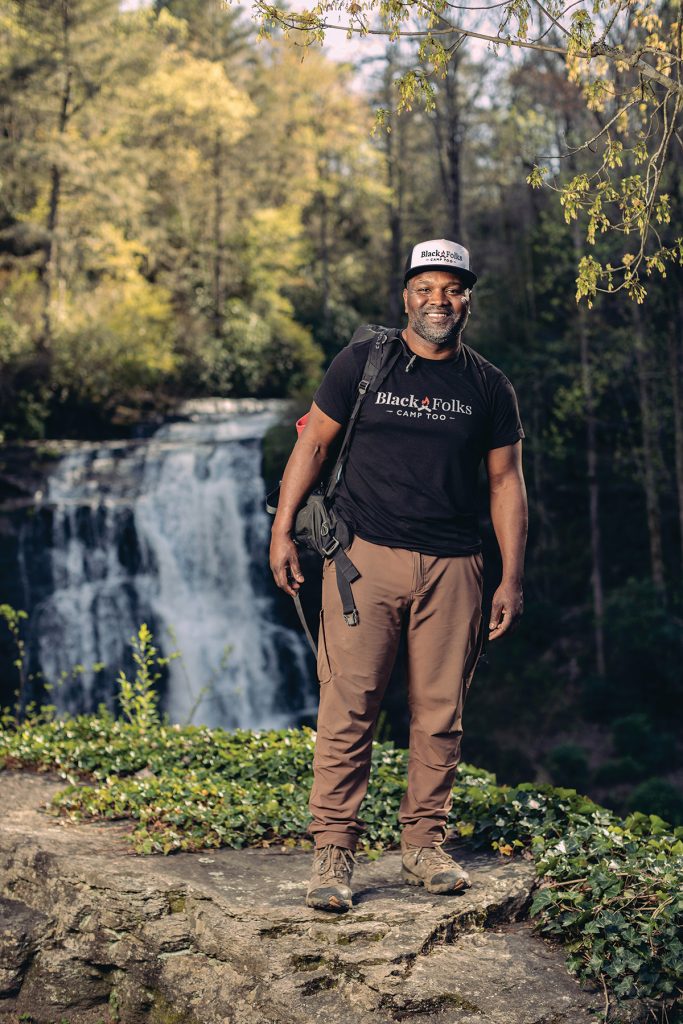Black Folks Camp Too promotes a culture of inclusion in the outdoors

LAND OF WATERFALLS, AGENT OF CHANGE
Earl B. Hunter, Jr., founder of Black Folks Camp Too, pauses at a local scenic spot, but his camping excursions take him to all corners of the country.
Photo by Jack Robert
Earl B. Hunter Jr. and his then 7-year-old son were awestruck as they stood in front of Mount Rushmore in South Dakota. “It was a very emotional trip,” says Hunter, who has a home in Transylvania County. “We saw America in a way that most Black folks haven’t.”
That was no vacation. Hunter and his son traveled about 14,000 miles, stopping at 49 campgrounds across 20 states while Hunter worked as VP of Sales for camping-trailer manufacturer Sylvansport.
How a Gucci-wearing, Jaguar-driving sales executive came to work for an outdoor lifestyle brand is actually simple. “I thought the product that Sylvansport was making was amazing,” Hunter says. His relationship-building style of business development proved profitable for the brand. Hunter brought in 17.5 million in sales (from a starting point of under one million) in just four years.

Photo by Jack Robert
Yet, while Hunter struck deals at every RV show in North America, the Black executive couldn’t help but notice: “I didn’t see many people who looked like me.” After returning with his son from their 2017 trip across the country, Hunter started thinking about a new business. And by October of 2019, Black Folks Camp Too was officially launched.
Hunter says the company’s name should be considered in its full context. Yes, the main point is to invite the Black community to the camping lifestyle, “so we see more people like us in the outdoors.” But the “too” is a call for inclusion: “We don’t mean that Black folks should only go camping with each other,” he explains. “We want Black folks to camp with anyone and everyone.”

Hunter and his children pitch a tent.
Photo by Jack Robert
The company’s mission is also about “removing fear and adding knowledge,” says Hunter. Because he grew up in the South, he understands why many Black folks have avoided backcountry experiences: “Due to intergenerational fear, Black folks are the only group that has been told not to go into the woods, and that’s because of all of the horrendous things done to our ancestors there.” Now, though, he wants more and more Black folks to enjoy the physical, mental, and family-bonding benefits of the outdoors.
Through education, equipping, and data collection, Black Folks Camp Too is changing the industry. “I want to see more Black folks experience what I’ve experienced in this lifestyle,” Hunter says. After being the master of ceremonies at the Outdoor Economy Conference in Asheville in 2019 and 2020, Hunter had an outdoor adventure he describes as “serene.”
He had just finished singing the Sam Cooke classic “A Change is Gonna Come” onstage (Hunter has a powerful voice and an inspiring energy) when two professors from Western Carolina University approached him and invited him to go backpacking with them.
Hunter had been RVing plenty of times, but backpacking was new. Over a series of Zoom calls, the guys shared advice about what gear he needed. “They removed my fear by sharing their information with me,” Hunter says. Even when they arrived at the trailhead in remote Panthertown Valley, his new backpacking buddies continued to instruct him.

Earl and his son at Mount Rushmore in 2017.
(photo courtesy Black Folks Camp Too)
As a former athlete, Hunter found the initial two-mile hike to the campsite easy. But after pitching their tents, the group of four (Hunter invited a friend) set out on a bigger adventure. “I thought maybe we’d go one or two miles more,” Hunter says. “[We] hiked 10 miles on an incline. The soles of my boots disintegrated. Then we trekked back down to the campsite to stay overnight.”
While sitting together around the campfire, Hunter experienced the greatest point of the whole trip. “We started having conversations,” he says. “They asked me questions. I asked them some hard questions. It doesn’t matter your race, your age, or your gender, we all have something to say. We can do it around a campfire because it has no walls.”
The “Unity Blaze” is the campfire in the center of the logo for Black Folks Camp Too. “It has always been the DNA of our company,” he says.

The Blacks Folk Camp Too founder and his family around the campfire. The “Unity Blaze” symbol is the central motif of the company’s logo and mission.
Photo by Jack Robert
The data that Hunter’s business collects has gotten the attention of some of the outdoor industry’s biggest brands. “We’ve taken groups RVing, hammock camping, back-country camping — we’re using that data and building an amazing digital-education initiative,” he says.
According to the Outdoor Industry Association, that industry accounts for $887 billion in annual consumer spending — more than Americans spend on pharmaceuticals and fuel combined. However, by not marketing more to Black folks, Hunter believes outdoor brands are leaving another $100 billion dollars on the table.
“A lot of companies right now are discussing DEI [diversity, equity, and inclusion] in the outdoors, but they don’t know where to start,” Hunter says. “Our job is to help them and encourage more Black folks to enjoy nature.”
For more information about Black Folks Camp Too and the Unity Blaze, visit blackfolkscamptoo.com.

Love this story and hiking is on my bucket list of things to do real soon. Camping is kinda/sorta growing on me; not there yet.
Read this article last night, ran into Earl at Sams Club. What a visionary, but down to earth and like able man.